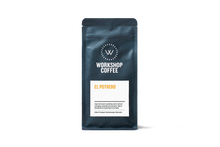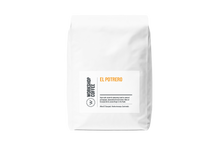
Expanding on a family tradition of tending to livestock, Maynor has invested in diversifying and renovating his inherited farm, Finca El Potrero. In 2004 he planted a range of new coffee varieties alongside plenty of shade trees, and has built his own wet mill to process his crop.
The Farmer
Learning to work with coffee from a young age, Maynor is following in his father’s footsteps in producing coffee on the family farm, Finca El Potrero. He lives with his wife and two children in Aldea El Coyegual, just 10km or so from the Mexican border. Close by in the community of Cipresales is Francisco Morales, whom we were able to visit last year and whose coffee (La Esperanza) we bought and roasted for espresso. Spending more time in the western region of San Marcos during our travels to Guatemala this year, we weren’t able to physically connect with Maynor, but through cupping with our friends and partners at Primavera in Guatemala City we were able to identify some really delicious lots from this same region, and Maynor’s coffee really stood out.
Maynor wishes to pass the coffee farm on to his children, to maintain the family tradition of cultivating coffee.
The Farm
Spanning 26 hectares, Finca El Potrero, which translates to “The Paddock” hints at the old primary function of the farm as land for livestock to graze. Coffee was first planted here by his father, but in 2004 after inheriting the farm, Maynor has expanded the range of coffee varieties grown on the farm to include Caturra, Catuaí, Bourbon & Typica. These now sit between 1,680 and 1,760 metres, amongst Chalum and Gravilea shade trees which create dappled light to protect the coffee trees from too much direct sunlight. They have invested not just in the plants and processing facilities at the farm, but also in terms of improving the accessibility of the farm. Back in 2004 it was a big challenge to get to the farm and transporting coffee can be an expensive and perilous job!
Their Approach
They divide the harvesting of their coffee cherries into three passes. This is to optimise the quantity of ripe cherry in each pick, which is one of the foundations of specialty coffee production. After receiving the coffee cherries at the wet mill, it is depulped and then left in a tank for 24 hours, so that the native microbiome breaks down the sugary fruit mucilage on the parchment coffee. After this the coffee is washed and scrubbed, before going back into a tank to spend a further 5 hours in clean water to “soak” the parchment coffee, a practice that we have seen add extra clarity and angularity to the cup profile of a coffee.




